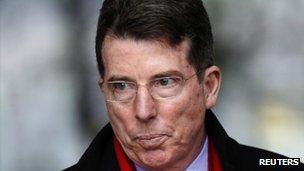RBS boss Stephen Hester rejects £1m bonus
- Published
- comments
Ed Miliband: "The government has got a completely tin ear when it comes to understanding what people are feeling"
Royal Bank of Scotland chief executive Stephen Hester has turned down his controversial bonus, worth nearly £1m.
BBC business editor Robert Peston said Mr Hester would renounce the £963,000 shares-only payment after succumbing to "enormous political pressure".
Chancellor George Osborne said it was a "sensible and welcome" decision that now let Mr Hester focus on getting back billions of pounds for the taxpayer.
Labour leader Ed Miliband said the RBS boss had "done the right thing".
Earlier, Labour said it would force a vote on the issue after Prime Minister David Cameron refused to block the bonus from the mostly publicly-owned bank.
'Out of touch'
Robert Peston said the board felt Mr Hester had earned the bonus for the way he had made RBS a less risky organisation.
But when it looked as though MPs were going to vote against it, the general consensus amongst the directors was that the "game was up", he added.
Earlier this month, RBS announced it would cut 3,500 jobs from its global banking division.
The cuts will mean RBS has removed 11,000 employees from its staff, almost halving its 2007, pre-credit crunch headcount of 24,000.
Shares in the bank have fallen 36% in the last year, falling 2% on Monday's open.
Shadow business secretary Chuka Umunna said Mr Hester was already being adequately rewarded for his performance.
"He received £1.2m a year - that's 46 times the average salary of an average employee in this country - to do that job," he said.
"Usually you receive a bonus when you've done something above and beyond - exceptional, extraordinary."
"But many of the things that have been cited in terms of things that he's done for the bank are things that you would expect him to do."
Mr Hester was awarded only 60% of his bonus, which is judged on five categories. These are: strategic direction;
business delivery and financial performance; stakeholders; risk and control; and capability and development.
But William Wright, investment bank analyst for Financial News told the BBC: "It sets a very dangerous precedent for RBS.
"It raises the level of political risk and political interference in the day-to-day running of RBS to what some people many consider to be intolerable levels.
"It raises very serious questions about who actually is running RBS day to day.
"Shareholders, in this case the UK government, appoint a board, which in turn appoints an executive team to run the bank, and here we have a situation where the board agrees something, which has been signed off by shareholders and then they have been forced into a U-turn by political opinion."
Former Liberal Democrat Treasury spokesman Lord Oakeshott said Mr Hester's decision was "better late than never".
"I'm glad that eventually Stephen Hester has seen sense and seen the outrage of most people in this country, and Lib Dems who have been complaining bitterly about this for weeks," he said.

Mr Hester's bonus would not look big compared with that of Barclays boss Bob Diamond, Mr Peston says
"I'm very sorry that David Cameron and George Osborne didn't see that, and have been defending the indefensible right up to today."
Mr Hester was appointed chief executive at the end of 2008 to replace Sir Fred Goodwin, after the bank had to be bailed out by the government, which now owns 82% of it.
RBS chairman Sir Philip Hampton had already announced that he would waive his payout.
He had been on course to claim 5.17 million RBS shares in February, but it is thought he told the bank's remuneration committee it would "not be appropriate" to take a £1.4m payout.
Robert Peston said RBS's directors now recognise it would have been better to delay Mr Hester's bonus decision until after it was revealed how much Barclays chief executive Bob Diamond received.
"Mr Hester's bonus would not look big in comparison," he explained.
- Published29 January 2012
- Published29 January 2012
- Published27 January 2012
- Published28 January 2012
- Published27 January 2012